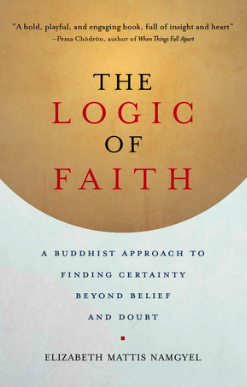The Essay as Buddhist Practice
Sitting on my cushion to meditate, I sometimes feel like I’m burrowing inside an essay. And at the keyboard, I take out a few Buddhist tools to chip away at whatever subject I’m pursuing.One of my teachers, Elizabeth Mattis Nyamgel, has a book called The Heart of an Open Question, which was really important to me and which seems to me to be a manifesto for essaying. The idea of questions without answers, and the goal of being open to look at life with an open, questioning heart, has become also what I find most compelling about the essay. The essay allows me to practice and reinforce the things I value in Buddhism, including reflection, not clinging to a single explanation or closing down around “rightness.” The practice in Buddhism of examining experience, and the encouragement to test out received truths for one’s self rather than to passively accept what is handed down, has strengthened my voice as an essayist and writer, as someone who doesn’t necessarily comes to conclusions but who can record the process of looking. The notion of interdependence, too, has a deep resonance with my experience in the world as a nonfiction writer: it’s all connected. I love burrowing into a tangent and finding that it opens into discoveries and themes I need to explore, helping me to get to know my own life.I am happy to be on the launch team for Elizabeth’s new book, The Logic of Faith, which is an in-depth exploration of a logic called Madhyamaka in which Buddhist practitioners are asked to look for singular discrete entities—including the self—and not find them as a way to become comfortable with our state, which is one of interdependence, and to increase our ability to bear the uncertainty of life with grace.As a writer, I imagine I’m not unique in finding crossovers between my different passions; life is so interconnected and interdependent that almost any pursuit or discipline produces insights and metaphors that apply to writing. And essaying is about looking deeply at life, an activity that requires spiritual support and often delivers spiritual fruits. At the same time, Elizabeth stresses the values of humility and awe in all of her writing, so I’m not saying that I’m such an enlightened being who has figured things out. Instead, Buddhism has supported my feelings of being okay with not-knowing and being on the path.
The practice in Buddhism of examining experience, and the encouragement to test out received truths for one’s self rather than to passively accept what is handed down, has strengthened my voice as an essayist and writer, as someone who doesn’t necessarily comes to conclusions but who can record the process of looking. The notion of interdependence, too, has a deep resonance with my experience in the world as a nonfiction writer: it’s all connected. I love burrowing into a tangent and finding that it opens into discoveries and themes I need to explore, helping me to get to know my own life.I am happy to be on the launch team for Elizabeth’s new book, The Logic of Faith, which is an in-depth exploration of a logic called Madhyamaka in which Buddhist practitioners are asked to look for singular discrete entities—including the self—and not find them as a way to become comfortable with our state, which is one of interdependence, and to increase our ability to bear the uncertainty of life with grace.As a writer, I imagine I’m not unique in finding crossovers between my different passions; life is so interconnected and interdependent that almost any pursuit or discipline produces insights and metaphors that apply to writing. And essaying is about looking deeply at life, an activity that requires spiritual support and often delivers spiritual fruits. At the same time, Elizabeth stresses the values of humility and awe in all of her writing, so I’m not saying that I’m such an enlightened being who has figured things out. Instead, Buddhism has supported my feelings of being okay with not-knowing and being on the path.